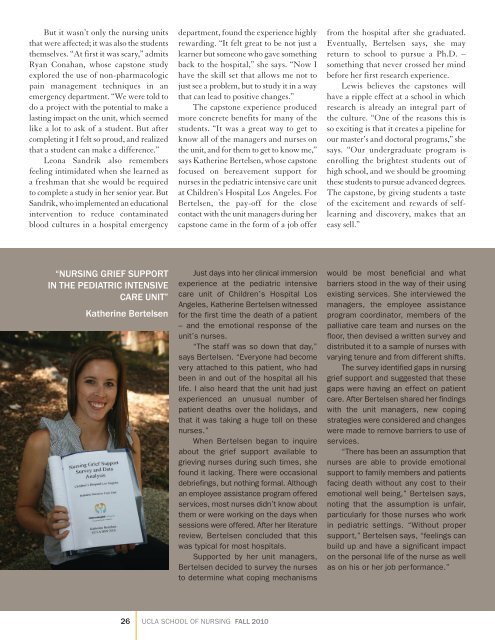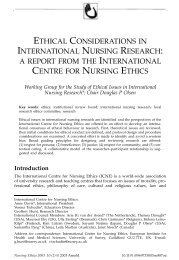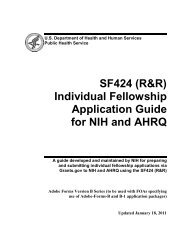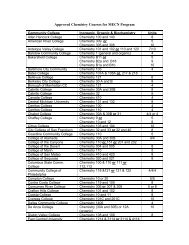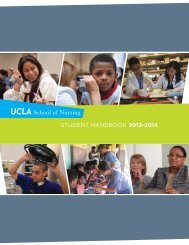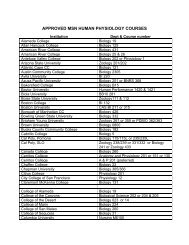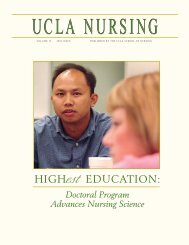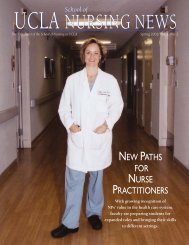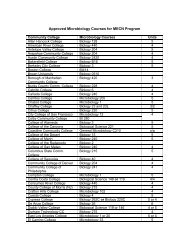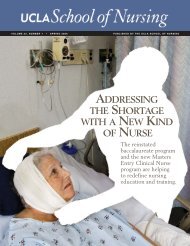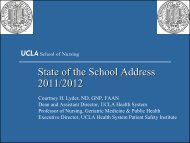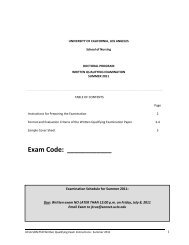proof positive - UCLA School of Nursing
proof positive - UCLA School of Nursing
proof positive - UCLA School of Nursing
You also want an ePaper? Increase the reach of your titles
YUMPU automatically turns print PDFs into web optimized ePapers that Google loves.
But it wasn’t only the nursing units<br />
that were affected; it was also the students<br />
themselves. “At first it was scary,” admits<br />
Ryan Conahan, whose capstone study<br />
explored the use <strong>of</strong> non-pharmacologic<br />
pain management techniques in an<br />
emergency department. “We were told to<br />
do a project with the potential to make a<br />
lasting impact on the unit, which seemed<br />
like a lot to ask <strong>of</strong> a student. But after<br />
completing it I felt so proud, and realized<br />
that a student can make a difference.”<br />
Leona Sandrik also remembers<br />
feeling intimidated when she learned as<br />
a freshman that she would be required<br />
to complete a study in her senior year. But<br />
Sandrik, who implemented an educational<br />
intervention to reduce contaminated<br />
blood cultures in a hospital emergency<br />
department, found the experience highly<br />
rewarding. “It felt great to be not just a<br />
learner but someone who gave something<br />
back to the hospital,” she says. “Now I<br />
have the skill set that allows me not to<br />
just see a problem, but to study it in a way<br />
that can lead to <strong>positive</strong> changes.”<br />
The capstone experience produced<br />
more concrete benefits for many <strong>of</strong> the<br />
students. “It was a great way to get to<br />
know all <strong>of</strong> the managers and nurses on<br />
the unit, and for them to get to know me,”<br />
says Katherine Bertelsen, whose capstone<br />
focused on bereavement support for<br />
nurses in the pediatric intensive care unit<br />
at Children’s Hospital Los Angeles. For<br />
Bertelsen, the pay-<strong>of</strong>f for the close<br />
contact with the unit managers during her<br />
capstone came in the form <strong>of</strong> a job <strong>of</strong>fer<br />
from the hospital after she graduated.<br />
Eventually, Bertelsen says, she may<br />
return to school to pursue a Ph.D. –<br />
something that never crossed her mind<br />
before her first research experience.<br />
Lewis believes the capstones will<br />
have a ripple effect at a school in which<br />
research is already an integral part <strong>of</strong><br />
the culture. “One <strong>of</strong> the reasons this is<br />
so exciting is that it creates a pipeline for<br />
our master’s and doctoral programs,” she<br />
says. “Our undergraduate program is<br />
enrolling the brightest students out <strong>of</strong><br />
high school, and we should be grooming<br />
these students to pursue advanced degrees.<br />
The capstone, by giving students a taste<br />
<strong>of</strong> the excitement and rewards <strong>of</strong> selflearning<br />
and discovery, makes that an<br />
easy sell.”<br />
“nursing grief support<br />
in the pediAtriC intensive<br />
CAre unit”<br />
Katherine Bertelsen<br />
Just days into her clinical immersion<br />
experience at the pediatric intensive<br />
care unit <strong>of</strong> Children’s Hospital Los<br />
Angeles, Katherine Bertelsen witnessed<br />
for the first time the death <strong>of</strong> a patient<br />
– and the emotional response <strong>of</strong> the<br />
unit’s nurses.<br />
“The staff was so down that day,”<br />
says Bertelsen. “Everyone had become<br />
very attached to this patient, who had<br />
been in and out <strong>of</strong> the hospital all his<br />
life. I also heard that the unit had just<br />
experienced an unusual number <strong>of</strong><br />
patient deaths over the holidays, and<br />
that it was taking a huge toll on these<br />
nurses.”<br />
When Bertelsen began to inquire<br />
about the grief support available to<br />
grieving nurses during such times, she<br />
found it lacking. There were occasional<br />
debriefings, but nothing formal. Although<br />
an employee assistance program <strong>of</strong>fered<br />
services, most nurses didn’t know about<br />
them or were working on the days when<br />
sessions were <strong>of</strong>fered. After her literature<br />
review, Bertelsen concluded that this<br />
was typical for most hospitals.<br />
Supported by her unit managers,<br />
Bertelsen decided to survey the nurses<br />
to determine what coping mechanisms<br />
would be most beneficial and what<br />
barriers stood in the way <strong>of</strong> their using<br />
existing services. She interviewed the<br />
managers, the employee assistance<br />
program coordinator, members <strong>of</strong> the<br />
palliative care team and nurses on the<br />
floor, then devised a written survey and<br />
distributed it to a sample <strong>of</strong> nurses with<br />
varying tenure and from different shifts.<br />
The survey identified gaps in nursing<br />
grief support and suggested that these<br />
gaps were having an effect on patient<br />
care. After Bertelsen shared her findings<br />
with the unit managers, new coping<br />
strategies were considered and changes<br />
were made to remove barriers to use <strong>of</strong><br />
services.<br />
“There has been an assumption that<br />
nurses are able to provide emotional<br />
support to family members and patients<br />
facing death without any cost to their<br />
emotional well being,” Bertelsen says,<br />
noting that the assumption is unfair,<br />
particularly for those nurses who work<br />
in pediatric settings. “Without proper<br />
support,” Bertelsen says, “feelings can<br />
build up and have a significant impact<br />
on the personal life <strong>of</strong> the nurse as well<br />
as on his or her job performance.”<br />
26 <strong>UCLA</strong> SCHOOL OF NURSING fAll 2010


